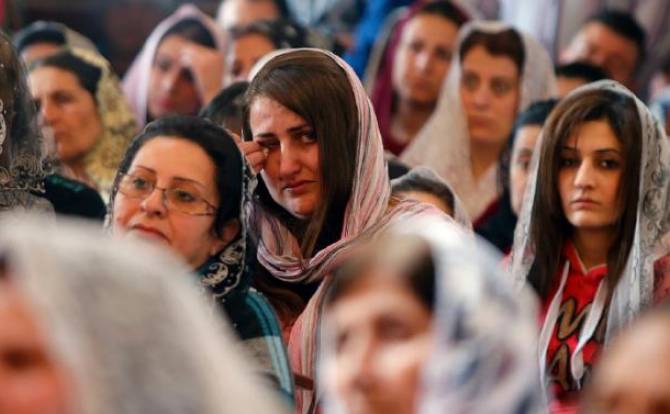“The Assyrian homeland is in northern Mesopotamia, present-day Iraq, where the ancient cities of Assur and Nineveh were built,” writes the scholar, Hannibal Travis.
“For 300 years, Assyrian kings ruled the largest empire the world had yet known. The Assyrian Church of the East records that the Apostle Thomas himself converted the Assyrians to Christianity within a generation after the death of Christ. Christianity was ‘well established and organized’ in Mesopotamia by the third century CE.”
Today a stateless and persecuted people, Assyrians have been continuously brutalized in the region by Turks, Kurds, Arabs, and Persians.
Every 50 years, there has been a massacre of Assyrians, according to the Assyrian International News Agency (AINA).
According to a report by the Center for the Study of Genocide and Human Rights of Rutgers University:
“The Assyrian people have been repeatedly victimized by genocidal assaults over the past century… Massacres, rapes, plundering, cultural desecrations, and forced deportations were all endemic. Around 750,000 Assyrians died during the genocide, amounting to nearly three quarters of its pre-war population. The rest were dispersed elsewhere, mostly in the Middle East.
“Unfortunately, the persecution of Assyrians did not end with the collapse of the Ottoman Empire. From August 8-11,1933, in the newly established state of Iraq, Assyrian villagers in the northern Iraqi town of Simele were brutally murdered. Some 3,000 men, women, and children were killed by Iraqi soldiers and Kurdish irregulars.”
As a result of continued persecution and discrimination, the Assyrians in Turkey, Syria and Iran, once sizeable communities, have almost completely been exterminated, apart from those who have fled to the U.S., Australia, Europe, Canada and Lebanon.
Why an Assyrian regional government is an urgent need?
The situation of Assyrians in Iraq is beginning to resemble the previous situation of those in Turkey, Iran, and Syria. Given all of the persecution to which Assyrians have been exposed and the lack of any support or protection from the West, the only way for Assyrian-Syriac-Chaldean people to survive is to have a protected “enclave” in the Nineveh Plain. As can be seen in the region every day, it is not realistic to expect the Assyrians to be quiet and accept their “fate” under the tender mercies of the rule of others.
The future Assyrian regional government could be an independent state or autonomous region like the Kurdistan Regional Government in Iraq. Even if it is city-state like Vatican City, it would be monumental in stopping the annihilation of Assyrian people and could also serve as a safe haven for other persecuted minorities.
All the Assyrian activists, politicians and scholars with whom Gatestone spoke asserted that the Assyrians should have a right to self-rule and security in the Nineveh Plain.
Yacoob Yaco, for instance, an Assyrian MP and political chair of the Nineveh Plain Protection Units (NPU), said that Assyrians are willing to defend their homeland. “For us to be able to do that effectively, the leading countries of the world must help us determine our fate, and to have our own political and military entity.”
Joseph Baba, the Western Regional Director for the Assyrian American National Federation, told Gatestone:
“We would like to help establish a political structure in Nineveh Plain — a secular republic — that is pluralistic and respects the ethnic and religious diversity of the Nineveh Plain. The Assyrian government would also cooperate with its neighbors and others to bring peace to the region and open the door to endless business opportunities for many Western countries to invest.”
“Forced displacement, persecution and genocide have caused the drastic decrease in our population,” said Anahit Khosroeva, an Assyrian historian specializing on genocide studies, who is based in Armenia.
“The international community just closes eyes on all these…The West should not continue ignoring Assyrians and Yazidis. Every inch of this land and every line of history tells who this territory belongs to. We deserve a state.”
David William Lazar, the chairman of the American Mesopotamian Organization, called for “the establishment of three new provinces in the districts of the Nineveh Plain, Talafar and Sinjar. “The current Iraqi constitution allows the proposed region to have its own parliament and executive branch similar to the region under the control of the Kurdish authorities.”
“The world should not expect us to be protected by any other forces but our own,” Juliana Taimoorazy, a leading Assyrian activist and the Founding President of the Iraqi Christian Relief Council, told Gatestone. “We have been betrayed by both the Iraqi military and the Kurdish Peshmerga, over and over again.”
She called on the Kurdish government to recognize Assyrian rights. “There are also Assyrians living under Kurdish rule. We ask the Kurdish government to honor Assyrians under their rule by recognizing our identity, flag, schools, churches, and language.”
In an interview with Gatestone, Sabri Atman, the founder of the Assyrian Genocide and Research Center (Seyfo Center), said:
“There are two options. Either Assyrians in Iraq will have their own government in Nineveh and will be a free nation, or they might be extinct in a few decades. In order to stop the latter from happening, the Assyrian administration in Nineveh should be protected by the UN and the US. The Assyrian claim for autonomy has never been realized. After centuries of persecution, is it not the time for Assyrians and other persecuted Christians to finally have their own government?”
Source: aina.org






